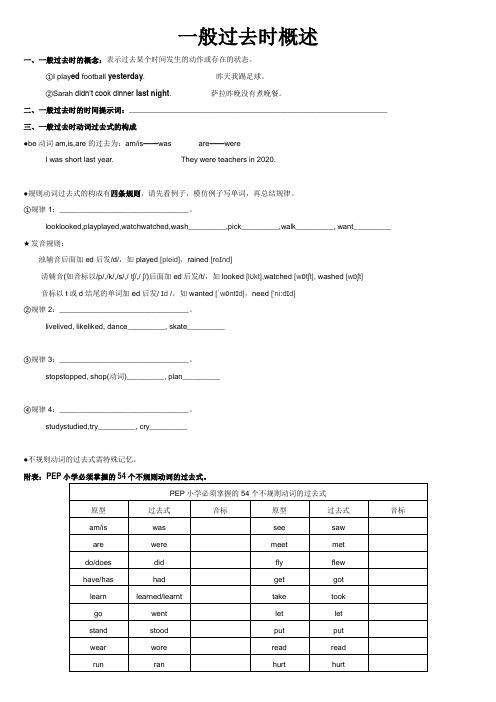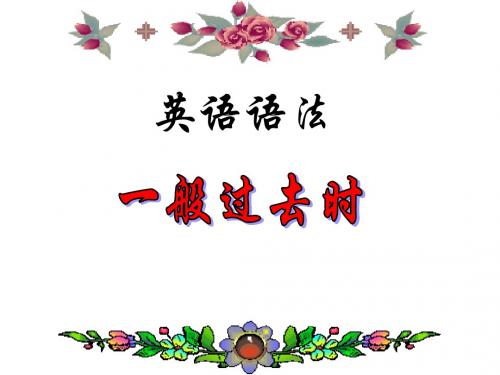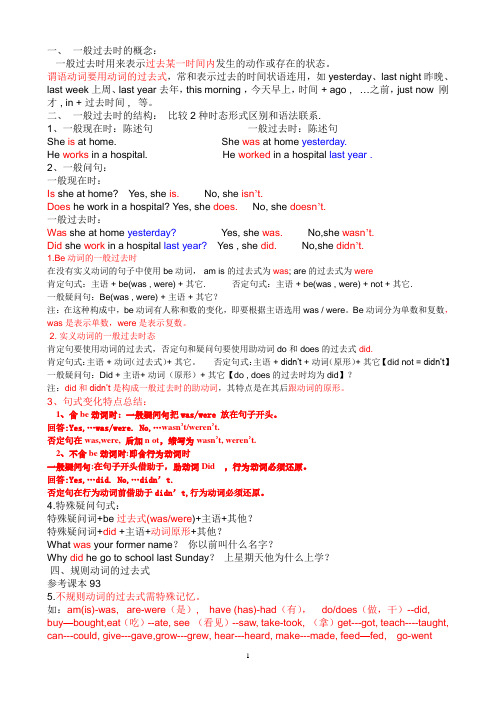一般过去时的概念和构成
一般过去时(讲义)-人教PEP版英语六年级下册

一般过去时概述一、一般过去时的概念:表示过去某个时间发生的动作或存在的状态。
①I play ed football yesterday. 昨天我踢足球。
②Sarah didn’t cook dinner last night. 萨拉昨晚没有煮晚餐。
二、一般过去时的时间提示词:______________________________________________________________三、一般过去时动词过去式的构成●be动词am,is,are的过去为:am/is——was are——wereI was short last year. They were teachers in 2020.●规则动词过去式的构成有四条规则,请先看例子,模仿例子写单词,再总结规律。
①规律1:_______________________________。
looklooked,playplayed,watchwatched,wash_________,pick_________,walk_________, want_________ ★发音规则:浊辅音后面加ed后发/d/,如played [pleid],rained [reɪnd]清辅音(如音标以/p/,/k/,/s/,/ tʃ/,/ʃ/)后面加ed后发/t/,如looked [lʊkt],watched [wɒtʃt], washed [wɒʃt]音标以t或d结尾的单词加ed后发/ɪd /,如wanted [ˈwɒntɪd],need ['ni:dɪd]②规律2:_______________________________。
livelived, likeliked, dance_________, skate_________③规律3:_______________________________。
stopstopped, shop(动词)_________, plan_________④规律4:_______________________________。
初一英语语法:一般过去时(共22张PPT)

cost →cost花钱
read→read读书
cut → cut 砍,剪 hurt → hurt受伤
2)变元音字母为a run→ran跑
give→gave给 sing→sang唱歌
come → came过来 drink→drank喝 swim→swam游泳
sit→sat坐下 begin→began开始
feel build fight give teach sing buy cut come draw drink drive hope use start
felt built fought gave taught sang bought cut came drew drank drove hoped used started
2. watch, John, did, TV, weekend, last. _J_o_h_n_d_i_d_w_a_t_ch__T_V_l_as_t_w_e_e_k_e_n_d_. ___________
3. went, I ,to, by, park, a, bike
_____I _w_e_n_t_t_o__a_p_a_r_k_b_y__b_ik_e__. ___________ 4. jumped, the, into, lake, he, and, the, to, swam, kite.
19) My sister _w_a__s_ (be) born on June 5. 1996. 20) W__e_r_e_ (be) your parents at home just now? 21) He _s_tu__d_ie_d_ (study) French here last year. 22) She __d_i_d_ (do) homework last night. 23) They _w__e_n_t(go) to the zoo yesterday morning. 24) We __h_a_d_ (have) a party last Saturday. 25) Joy _v_is_i_te__d (visit) me yesterday evening. 26) They __l_iv_e_d_ (live) here two years ago. 27) He _w__a_s_(be) here a moment ago.
一般过去时

三.一般过去时(simple past tense)1.概念一般过去时表示过去某一时刻,某一段时间发生的动作或存在的状态。
一般过去时用动词的过去式表示。
2.构成一般过去时用动词的过去式表示。
be的过去式有was,were两种; have 的过去式是had;规则动词的过去式在动词词尾加-ed,具体构成规则如下:1)一般情况,动词后加ed,例词work-worked,clean-cleaned,play-played,wash-washed2)以不发音的e结尾,-d,例词live-lived,move-moved,hope-hoped,arrive-arrived 3)以辅音字母+y结尾,变y为 i再加-ed,例词study-studied,carry-carried,cry-cried,identify-identified 4)以辅音字母结尾的重读闭音节,双写最后一个辅音字母加-ed,例词plan-plannedstop-stopped,beg-begged,grab-grabbed 3.用法 (1) 表示发生在过去的动作或存在的状态。
如:He went shopping with his friends last week.They arrived ten minutes ago.He became a hotel manager ten years ago.Did you go to the concert last night?(2) 表示在过去经常发生的动作或习惯动作。
如:He visited his grandparents once a month last year.She usually went to work by car last year.When I was at school, I always went to school by bus.4.如何识别一般过去时常见的标志词有:1). yesterday, the day before yesterday.2). last week / year / month / term …(简称last系列)3). two hours ago, three years ago, a moment ago…(简称ago系列)4). in / on + 过去的年/月/日,如 in 1999, on April, 20055). just now, once upon a time, one day…5.易错点例析:(1)——Your phone number again? I _________ quite catch it.——It’s 4331577A. didn’tB. couldn’tC. don’tD. can’t(2)——Mr. Smith isn’t coming tonight.——But he _________.A. promisesB. promisedC. will promiseD. had promised(3) ——Hey, look where you are going!——Oh, I’m terribly sorry. _________.A. I’m not noticingB. I wasn’t noticingC. I haven’t noticedD. I don’t notice(4) ——Oh it’s you ! I _________ you.——I’ve had my hai r cut.A. didn’t realizeB. haven’t realizedC. didn’t recognizeD. don’t recognized(5) ——Since you’ve agreed to go, why aren’t you getting ready?——But I _________ that you would have me start at once.A. don’t realizeB. didn’t realizeC. hadn’t realizedD. haven’t realized(6) ——It’s twelve o’clock, I think I must be off now.——Oh, really? I _________ it at all.A. don’t realizeB. haven’t realizedC. didn’t realizeD. hadn’t realizedKey:ABBCBC6.中考真题及模拟(2009朝阳区一模)He went into his room, _______ the light and began to work.A. has turned onB. will turn onC. turns onD. turned on(2009海淀一模)——What’s the best food have you had in Beijing, Alex?——Roast duck! I _________to a famous restaurant to have it last week.A. have goneB. goC. will goD. went(2009宣武区一模)——Do you know how many gold medals the 23-year-old Michael Phelps _____________at the 2008 Summer Olympic Games?——Eight.A. winB. winsC. wonD. has won(2008北京)We were in Qingdao last week and __________ great fun there.A. will haveB. have hadC. hadD. have(2007北京)——What did you do after school yesterday?——I _________basketball with my friends.A. playB. playedC. will playD. am playing(2005北京)---Hi, Kate. You look tired. What’s the matter?---I ______well last night.A. didn’t sleepB. don’t sleepC. haven’t sleptD. won’t sleep (2008四川泸州)Yesterday,Tony’s family _________ a good time.A. hasB. haveC. had(2007湖南湘潭)I’m sorry you’ve missed the train. It _______10 minutes ago.A. leftB. has leftC. had left(2007福州)——Mr Green, __________you________ Three Lanes and Alleys(三坊七巷)last Sunday?——No, but I’ll visit them next week.A. will; go toB. have; been toC. did; go toD. have; gone to (2007浙江)——What did the teacher say just now?——He __________us not to play computer games all day.A. tellsB. toldC. has toldD. is told(2007江西)——Inventors have changed the way we live.——So they are famous for the great things they _________.A. doB. didC. are doingD. had done(06江西)——Where’s the cake I made this morning?——We _______ it, mum. Can you make another one for us?A. ateB. eatC. will itD. were eating。
一般过去式知识点

一般过去式及练习一、基本概念一般过去时(simple past tense)表示过去某个时间里发生的动作或状态;过去习惯性、经常性的动作、行为;过去主语所具备的能力和性格。
二、基本结构主语+动词过去式+其他否定形式①was/were+not;②在行为动词前加didn't,同时还原行为动词主语+do+其他?例句She often came to help us in those days. Ididn't know you were so busy.一般过去式的构成形式肯定式疑问式否定式疑问否定式I worked Did I work? I did not work Did I not work?He(she,it) worked Did he(she,it)work?He (she,it)didnot workDid he(she,it)notwork?We worked Did we work? We did not work Did we not work?You worked Did you work? You did not work Did you not work?They worked Did they work? They did not work Did they not work?三、一般过去时的用法(1)一般过去时表示在过去某个特定时间发生,也可以表示过去习惯性、经常性的动作。
一般过去时不强调动作对现在的影响,只说明过去的事情。
句式:主语+过去动词+宾语+其他如:I had a word with Julia this morning.今天早晨,我跟朱丽亚说了几句话。
He smoked many cigarettes a day until he gave up. 他没有戒烟的那阵子,抽烟抽得可凶了。
(2)一般过去时常与表示过去的时间状语或从句连用,如:yesterday, last week, in 1993, at that time, once, during the war, before, a few days ago, when 等等。
一般过去时的构成及用法

一般过去时的构成及用法:一、一般过去时的概念和用法:1. 表示过去的动作或状态,常和明确的过去时间状语连用,如:yesterday, last week, threedays ago, in 1998,just now等连用。
2. 也可以表示过去某一段时间内经常或反复出现的动作。
句子中常带有every day, often,usually, always, sometimes等时间状语。
二、一般过去时的结构:1、主语+was/were+表语.a.肯定句:主语+was/were+表语.b.否定句:主语+was/were+not+表语.c.一般疑问句:Was I / he/ she/ it/ 人名...? Yes, I/ he/ she /it/ 人名+was. No, I/ he/ she/ it/人名+wasn’t.Were we/ you/ they...? Yes, we/ you /they were. No, we/ you/ they weren’t.2、主语+行为动词+谓语。
a.肯定句:I /He/She/It/ We/You/They studied…b.否定句:I/ He /She/It/ We /You/They did not study…c.一般疑问句:Did he/she/ it/ we/you/ they study..?Yes,you did. / No,you didn’t.三、动词过去式的构成:1. 含有be动词的:am, is 变成wasare 变成were2.含有行为动词的:(1)规则动词过去式的构成有四条规则:①一般在动词原形末尾直接加上-ed。
如:look-looked。
②以不发音的字母e结尾的动词,去e再加-ed。
如:live-lived。
③以辅元辅结尾的,先双写末尾这个辅音字母,再加-ed。
如:stop-stopped。
④末尾是辅音字母+y结尾的动词,先变y为i,然后再加-ed。
一般过去时详解

一、一般过去时的概念:一般过去时用来表示过去某一时间内发生的动作或存在的状态。
谓语动词要用动词的过去式,常和表示过去的时间状语连用,如yesterday、last night昨晚、last week上周、last year去年,this morning ,今天早上,时间 + ago , …之前,just now 刚才 , in + 过去时间 , 等。
二、一般过去时的结构:比较2种时态形式区别和语法联系.1、一般现在时:陈述句一般过去时:陈述句She is at home. She was at home yesterday.He works in a hospital. He worked in a hospital last year .2、一般问句:一般现在时:Is she at home? Yes, she is.No, she isn’t.Does he work in a hospital? Yes, she does. No, she doesn’t.一般过去时:Was she at home yesterday? Yes, she was. No,she wasn’t.Did she work in a hospital last year? Yes , she did. No,she didn’t.1.Be动词的一般过去时在没有实义动词的句子中使用be动词, am is 的过去式为was; are的过去式为were肯定句式:主语 + be(was , were) + 其它. 否定句式:主语 + be(was , were) + not + 其它.一般疑问句:Be(was , were) + 主语 + 其它?注:在这种构成中,be动词有人称和数的变化,即要根据主语选用was / were。
Be动词分为单数和复数,was是表示单数,were是表示复数。
2. 实义动词的一般过去时态肯定句要使用动词的过去式,否定句和疑问句要使用助动词do和 does 的过去式 did.肯定句式:主语 + 动词(过去式)+ 其它。
一般过去时 时间状语

一般过去时的时间状语简介一、一般过去时的概念一般过去时表示过去某个时间发生的动作或存在的状态,通常表示过去的事实或经历,不涉及现在的情况。
例如:He lived in Beijing for ten years. 他在北京住了十年。
She bought a new dress yesterday. 她昨天买了一件新裙子。
一般过去时也可以表示过去经常反复发生的动作,常和often, always, sometimes等频率副词连用。
例如:He often played football with his friends when he was young. 他年轻时经常和朋友们踢足球。
二、一般过去时的构成一般过去时的肯定句和否定句的构成方法是在动词原形后加-ed或不规则变化,否定句在动词前加did not。
例如:动词原形过去式肯定句否定句work worked I worked hard.I did not work hard.study studied He studied English.He did not study English.go went She went to the park.She did not go to the park.see saw They saw a movie.They did not see a movie.一般过去时的一般疑问句和特殊疑问句的构成方法是在句首加did或疑问词+did,动词用原形。
例如:动词原形过去式一般疑问句特殊疑问句work worked Did you work hard?What did you work on?study studied Did he study English?How did he study English?go went Did she go to the park?Where did she go?see saw Did they see a movie?What movie did they see?三、一般过去时的用法一般过去时常和表示过去的时间状语连用,如yesterday, last week, ago等。
小学一般过去时ppt课件

常与表示过去的时间状语连用
如yesterday, last week等。
2024/1/26
8
肯定句使用场景举例
1 2
描述过去发生的事情
如"I went to the park yesterday."(我昨天去 了公园)。
表达过去的习惯或经常性动作
如"She always walked to school when she was young."(她年轻时总是步行去学校)。
5
时间状语及标志词
2024/1/26
时间状语
yesterday,last week,an hour ago等。
标志词
ago(以前),just now(刚才 ),then(那时)等。
6
PART 02
肯定句结构与用法
REPORTING
2024/1/26
7
肯定句结构特点
主语 + 动词过去式
表示过去某个时间发生的动作或状态。
式。
注意动词变化
掌握规则动词和不规则动词的 过去式变化,避免使用时出现
错误。
结合语境理解
在阅读和听力练习中,结合上 下文语境理解一般过去时的用
法。
模仿和练习
通过模仿和练习,逐渐熟练掌 握一般过去时的运用技巧。
2024/1/26
26
THANKS
感谢观看
REPORTING
2024/1/26
27
疑问句句尾语调上升。
2024/1/26
16
疑问句使用场景举例
对过去发生的事情进行提问。
2024/1/26
对过去某个时间点的状态进行 提问。
对过去某个时间段内发生的动 作进行提问。
- 1、下载文档前请自行甄别文档内容的完整性,平台不提供额外的编辑、内容补充、找答案等附加服务。
- 2、"仅部分预览"的文档,不可在线预览部分如存在完整性等问题,可反馈申请退款(可完整预览的文档不适用该条件!)。
- 3、如文档侵犯您的权益,请联系客服反馈,我们会尽快为您处理(人工客服工作时间:9:00-18:30)。
一般过去时的概念和构成
概念:一般过去时表示过去经常或某一段时间内发生的动作或存在的状态。
构成:一般过去时没有人称和数的变化,句子中的动词动词一律用过去式。
动词过去式的变化规则
(1)规则变化
情况变化规则原形动词的过发音规则
去式
一般动词直接加ed play played在清辅音后
以不发音e结直接加d 尾的动词love,hope loved,hoped读[t]
,use,like,used,liked在元音和浊
末尾只有一先双写这stop,plan stopped,pla辅音后读
个辅音字母个辅音字的重读闭音母再加ed 节词nned[d]
在[t][d]后
读[Id]
以辅音字母先变y为i study,wor studied,wor
加y结尾的动再加ed ry ried
词
(2)不规则动词变化
时间标志:
在一般过去时的句子中都有一个明确的过去时间状语,或通过练
我昨天五
习上下文能确切知道动作发生在过去。
Y esterday (昨天)the day before yesterday (前天)
last week\month\year\summer\night (上周,上个月,去年,去年
夏天,昨晚)three days ago (三天前)the other day (不久前某一
天)just now (刚才),in the p ast (在过去)
,in 2009(在 2009 年)
例如:
I got up at 5 o’clock yesterday.点钟起床。
He was at Australia last year .他去年在澳大利亚。
His father went home at t en the day before yesterday . 他爸爸前天十
点回家。
一般过去时的句式及转换 (1) be 动词的一般过去时
肯定句:主语+be 动词的一般过去时(was/were)+其他
否定句:主语+be 动词的一般过去时(was/were)+not+其他
一般疑问句:be 动词的一般过去时(was/were)+主语+其他
(2) ther e be 结构的一般过去时与 be 动词的一般过去时的变化
基本一致
(3) 一般动词的过去时
肯定句:主语+动词的过去时+其他
否定句:主语+did not+动词原形+其他
一般疑问句:Did+主语+动词原形+其他。
